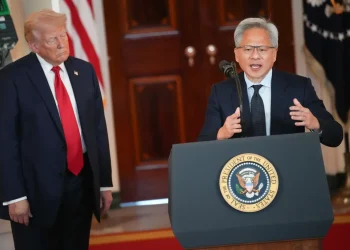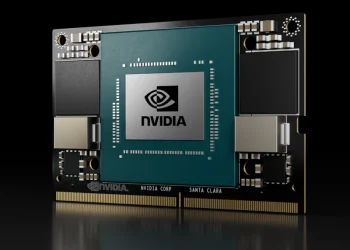Nvidia earnings AI demand will dominate investor attention this week as the company prepares to report quarterly results on Wednesday after the market closes. Analysts expect adjusted earnings per share (EPS) of $0.88 and revenue of $43.3 billion, according to Bloomberg data. This marks a sharp increase from last year’s adjusted EPS of $0.61 on revenue of $26 billion.
Nvidia, a leading supplier of AI chips, plays a crucial role in the broader tech sector and the S&P 500. Its performance often signals broader market sentiment. Shares have remained flat in 2025 after a volatile start, with concerns over rising AI competition and new tariff threats weighing on investor confidence.
Since ChatGPT’s launch in November 2022, Nvidia has contributed nearly 17% of the S&P 500’s gains, underscoring its dominance in the AI hardware space. Investors are eager to see if the company can maintain that momentum in the face of escalating trade pressures and rising inflation fears.
The U.S. recently introduced tariffs targeting tech imports, prompting worries about price spikes and renewed inflation. However, recent economic indicators suggest inflation is easing. Economists forecast the April core PCE, due Friday, will land at 2.5% year-over-year, slightly down from March’s 2.6%. The monthly core PCE is projected at 0.1%, above the previous 0% reading.
Bank of America economist Aditya Bhave believes May’s inflation data, due in June, will reveal the first real signs of tariff impacts. Until then, Nvidia’s earnings will offer critical insight into how top-tier tech firms are managing the policy environment and global demand for AI infrastructure.
Wednesday also marks the effective end of the first-quarter earnings season. With 93% of S&P 500 companies reporting, earnings growth has averaged 12.9%, far above the 7.1% projected on March 31, per FactSet’s John Butters. Fewer companies withdrew full-year guidance, suggesting increased confidence. Only eight companies have pulled guidance this quarter, compared to 185 during Q1 of 2020 at the pandemic’s peak.
Investors will also monitor Nvidia’s impact on other tech giants. Upcoming results from Salesforce, Okta, Macy’s, and C3.AI will add context, but Nvidia’s AI exposure gives it unique influence.
Meanwhile, concerns over President Trump’s trade threats have shaken markets. On Friday, Trump announced a 25% tariff on Apple products made outside the U.S. and threatened to raise EU tariffs to 50% in June. These moves pulled the S&P 500 down 2.6%, while the Nasdaq and Dow fell 2.4%. Interest rate-sensitive stocks took a bigger hit, with the Russell 2000 Index dropping nearly 4%.
Yields on Treasury bonds climbed throughout the week. The 10-year Treasury pushed above 4.6%, while the 30-year yield hovered near 5.1%, its highest since 2007. However, Friday’s bond rally brought the 10-year back below 4.5%, a level seen as crucial by Piper Sandler’s Michael Kantrowitz. He believes yields must stay below that level, and tariffs must ease, for equities to bounce back.
Nvidia earnings AI demand trends will likely influence how markets absorb this week’s other news. Key data includes Tuesday’s consumer confidence, durable goods orders, and FHFA house prices. On Wednesday, investors will review the FOMC meeting minutes, while Thursday brings a GDP revision and jobless claims.
Friday’s PCE inflation report is the week’s major economic headline. Any surprises in Nvidia’s numbers or in inflation metrics could reshape expectations for tech and interest-rate-sensitive sectors heading into June.








